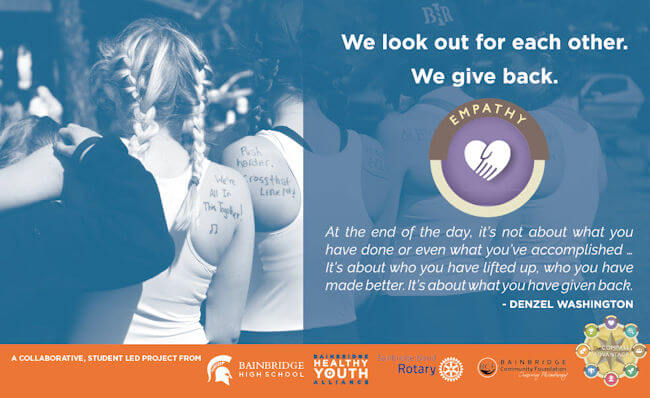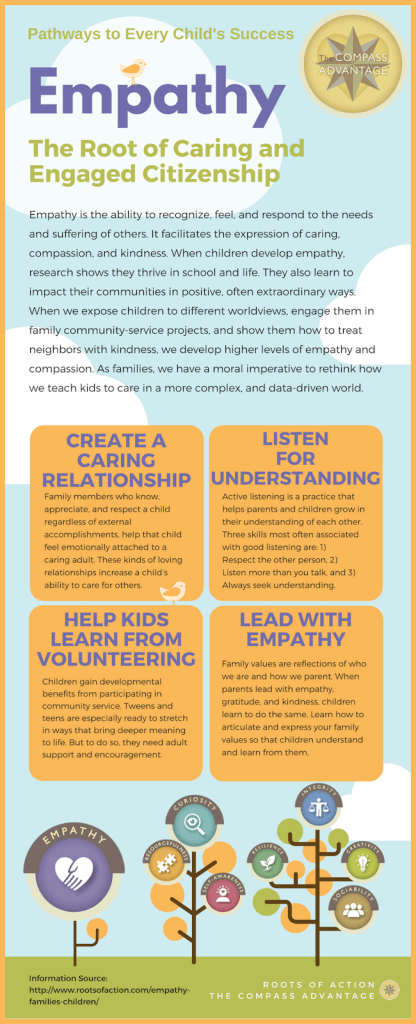
If you had to choose between teaching your child empathy or helping her study for tomorrow’s math test, which would you choose?
If you had to choose between raising a kind child or making sure he was fully prepared for next week’s basketball tournament, which would you choose?
Of course, parents shouldn’t have to choose between cultivating empathy and a child’s everyday activities and accomplishments. Yet, this choosing often occurs unconsciously as families focus on daily external successes rather than core internal abilities that foster life success.
Acquired through emotional attachment with other caring human beings, empathy is our ability to recognize, feel, and respond to the needs and suffering of other people.
Why is empathy critical to your child’s development? How do parents lead children toward a caring life? This article explores answers to these questions and provides practical, research-proven ways to contribute to your child’s social-emotional well-being by teaching them empathy, compassion, gratitude and kindness.
Why Empathy is Important to Your Child’s Success
Many parents believe empathy is one of those soft skills, like courage or humility, that are important to healthy development. But according to educational psychologist, Dr. Michele Borba, empathy reigns supreme among social-emotional skills and plays a surprising role in predicting kids’ life-long success.
Borba has studied the role of empathy in children and adolescents for many years. She suggests empathy is the key to raising healthy, thriving children. With over 350 references to neuroscience and developmental research in her book UnSelfie: Why Empathetic Kids Succeed in Our All-About-Me World, Borba not only makes the case for empathy, but also identifies nine teachable habits that foster its development.
When children develop empathy, research shows they thrive in school and life. They also learn to impact their communities in positive, often extraordinary ways.
In my book Tomorrow’s Change Makers, young people spoke about how their greatest teachers not only fostered empathy, but also inspired them to put empathy into action in the world around them. In many cases, they named their parents as those teachers.
As parents, we must ask, “Have we misled children to believe success is achieved through test scores, material wealth, and personal gain alone?” What other ways should we define success?
The Digital Age has given our children more ways to connect with others than ever before, but many researchers are concerned with how social networking and fewer face-to-face relationships may have contributed toward a 48% drop in empathetic concern for others over the past few decades. Studies also link low empathy to increased bullying, narcissism, rigid belief systems, and civic apathy.
As families, we have a moral imperative to rethink how we teach kids to care in a more hurried, complex, and data-driven world. In fact, individual and societal success depends on our ability to do so.
Below are ways you can start today to foster empathy in your child!
Students from Bainbridge High School in Washington State chose the photo, words, and quote for the above EMPATHY banner — one of seven that hang in the hallways of their school to remind all students of the core abilities that matter most to their development and wellbeing.
12 Ways to Foster Empathy in Your Child
1. Create a caring relationship.
To develop the capacity to feel empathy for others, a child must feel seen, felt, heard, and understood by at least one primary caregiver. Family members who know, appreciate, and respect a child regardless of external accomplishments help that child feel emotionally attached to a caring adult. These kinds of loving relationships increase a child’s ability to care for others. Learn 50 everyday ways to grow happy, caring kids.
2. Listen for understanding.
Active listening is a practice that helps parents and children grow in their understanding of each other. Three skills most often associated with good listening are: 1) Respect the other person, 2) Listen more than you talk, and 3) Always seek understanding. The next time you and your child have difficulty listening, try a simple listening exercise developed by family therapist, Susan Stiffelman.
3. Teach a growth mindset.
Let your child know that empathy is not a fixed trait—that it develops over time. Dr. Michele Borba suggests telling kids: “Empathy can be increased with practice just like your muscles stretch with exercise…. The more you practice, the better you’ll be at understanding another’s thoughts and feelings.” Read Borba’s practical advice on how to nurture empathy.
4. Rethink how kids learn kindness.
It is no surprise that adults feel good about themselves when they show kindness to their children and grandchildren. Not only do good deeds make us feel better, but as David Brooks explained in his article “Nice Guys Finish First,” people who are kind and compassionate are often the most successful. That said, we don’t make children happy when we simply enable them to be receivers of kindness. We heighten their feelings of happiness, improve their well-being, reduce bullying, enrich their friendships, and build peace by teaching them to be givers of kindness. Learn about teaching kindness.
5. Transform gift-giving into lasting family values.
Gift-giving during the holidays, or for other special occasions, can shape children’s lifelong identities. The values your family holds about gift-giving can be turned into powerful lessons that teach compassion, empathy, and kindness. Be proactive about your values as you develop holiday traditions. Include children in conversations about how to give to others. Read more about gift-giving.
6. Instill compassion at home.
Regarded as one of the greatest human virtues by all major religious traditions, compassion is an emotional response and attitude toward others that is deeply empathetic. It enables us to connect to human suffering with care and understanding, acting in ways that brings comfort to those around us. Families instill compassion at home by: 1) Providing opportunities to practice compassion, 2) Helping children understand anger; and 3) Teaching children to self-regulate their emotions. Read more about compassion.
7. Show kids why giving back matters.
Families who demonstrate caring, cooperation, compassion, kindness, service, teamwork, and the importance of getting along with others are powerful empathy-builders. From elementary school through high school, children should evolve through three developmental stages as they take on roles in society: (1) Being responsible citizens; (2) Improving their communities; and (3) Contributing to solve societal problems. Explore these stages and related community service ideas.
8. Expose children to different opinions and worldviews.
When families cultivate curiosity about how individuals and groups of people see the world differently, they expand children’s intellectual, interpersonal, and emotional boundaries. They help children recognize and understand differing perspectives. When challenged to explore prejudices, find commonalities, and glean meaning from what they imagine life would be like to walk in another person’s shoes, children build a greater capacity for empathy.
9. Nurture positive citizenship.
Raising children to become active citizens doesn’t happen by chance. It happens when children 1) Connect with others in need, 2) Confront moral dilemmas, 3) Reflect on their values, 4) Notice how social issues are connected, and 5) Create positive and passionate civic identities. Learn how this developmental process emerges and how adult support is an essential ingredient.
10. Help kids learn from volunteering.
Children gain developmental benefits from participating in community service. Tweens and teens are especially ready to stretch in ways that bring deeper meaning to life. But to do so, they need adult support and encouragement. Learn why taking an interest in your child’s volunteering can help them get the most from their experiences.
11. Lead with empathy.
Family values are reflections of who we are and how we parent. When parents lead with empathy, gratitude, and kindness, children learn to do the same. Learn how to articulate and express your family values so that children understand and learn from them.
12. Discuss money and giving.
Ron Lieber, author of The Opposite of Spoiled: Raising Kids Who Are Grounded, Generous, and Smart about Money, says, “Every conversation about money is also about values. Allowance is also about patience. Giving is about generosity. Work is about perseverance.” The more kids learn about money from an early age, the more they can contribute to family conversations that tap into deep emotions and moral dilemmas. These discussions can help children put themselves in other children’s shoes, help them understand people different from themselves, and provide opportunities for them to give their own earned money to benefit others.
Empathy Infographic
The following infographic was created from the material in this article. Please feel free to copy, print, and share it with others on social media!
Learn More About Empathy
Check out the following books to learn more about empathy and why it’s so important to your child’s success and well-being:
UnSelfie: Why Empathetic Kids Succeed in Our All-About-Me World, by Michele Borba
No More Mean Girls: The Secret to Raising Strong, Confident, and Compassionate Girls, by Katie Hurley
Empathy: Why It Matters, and How to Get It, by Roman Krznaric
For Children:
Stand in My Shoes: Kids Learning About Empathy, by Bob Sornson
Be Kind, by Pat Zietlow Miller
Articles in this Parenting Series
Successful Kids Need 8 Core Abilities: How to Parent With Purpose
Curiosity: How Parents Foster Lifelong Learning in Children
Sociability: How Families Learn Together with Love and Respect
Resilience: How Families Grow from Adversity
Self-Awareness: How Parents Foster Meaning and Purpose in Kids
Integrity: How Families Teach and Live their Values
Resourcefulness: How Parents Help Children Achieve Goals
Creativity: How Parents Nurture the Evolution of Children’s Ideas
Empathy: How Families Lead with Gratitude and Kindness (Currently Reading)
Free Resources for Parents
My Parenting Promise: a frame-ready document that helps reinforce the compass abilities through parenting practices.
I Have a Dream: a frame-ready document created by youth—to discuss with your children.
Reframing Success: Helping Children & Teens Grow from the Inside Out: an eBook that introduces The Compass Advantage. This eBook has been widely used by schools as a “Book Club” reading to engage parents about raising healthy children and teens.
Photo Credits: Bainbridge Healthy Youth Alliance;
Published: May 7, 2017





